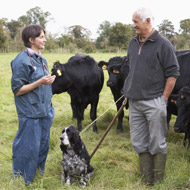BVA welcomes Defra announcement on bovine TB

"We hope this news will provide further motivation for those farms that are currently TB free but do not yet meet the six-year threshold" - Simon Doherty, BVA president.
BVA president Simon Doherty has welcomed a government announcement on bovine TB (bTB).
On Tuesday (18 December), Defra announced that farmers with herds in the Edge Area of England who have remained clear of bovine TB for at least six years will be able to revert to annual, rather than six-monthly, testing.
Defra hopes the move will reduce the testing burden on lower-risk farms and incentivise other farms to take steps to mitigate their risk of bTB. The change will take effect in May 2019.
“From stringent biosecurity to the application of risk-based trading principles, farmers need to be doing everything they can to stop this disease spreading,” said farming minister George Eustice. “As a Government we will also continue to robustly apply a range of interventions, including cattle movement controls, increased and better TB testing and licensed badger control in certain areas.”
Responding, BVA president Simon Doherty said the BVA was 'pleased to see the government taking a risk-based approach to TB testing' and reducing the burden on lower-risk farms. He added the change reflects recommendations BVA made earlier this year, that Cattle Health Certification Standards should be prioritised and incentivised, with compliance linked to reduced testing and regulatory burden.
“Farms that have been accredited under the industry-led scheme require a raft of biosecurity measures to be in place and we hope this news will provide further motivation for those farms that are currently TB free but do not yet meet the six-year threshold,” he said.
“We welcome the second round of applications for the Badger Edge Vaccination Scheme, and the accompanying grants, to create a buffer zone between the highest and lowest risk areas of England. Halting the spread of bovine TB is essential and it is vital that we continue to take a comprehensive, collaborative and risk-based approach to curbing this devastating disease.”



 The RCVS has announced a new version of its 1CPD mobile app, with enhanced features for veterinary surgeons and veterinary nurses to record their continuing professional development.
The RCVS has announced a new version of its 1CPD mobile app, with enhanced features for veterinary surgeons and veterinary nurses to record their continuing professional development.